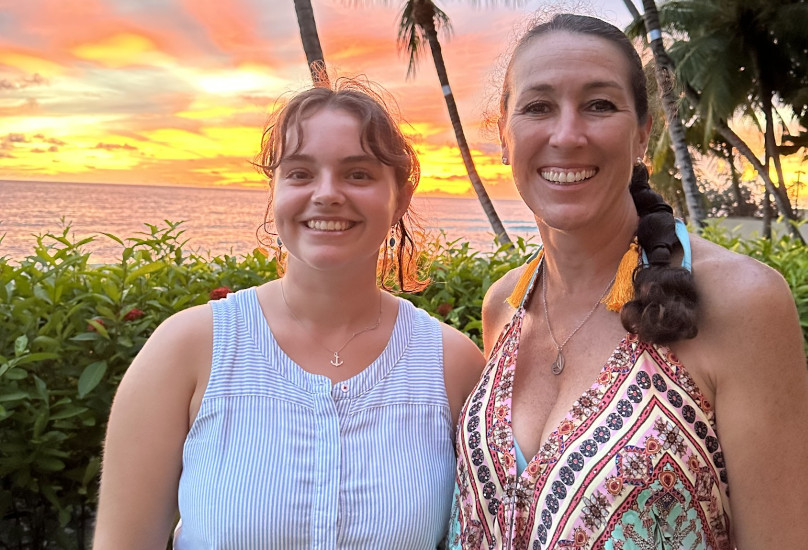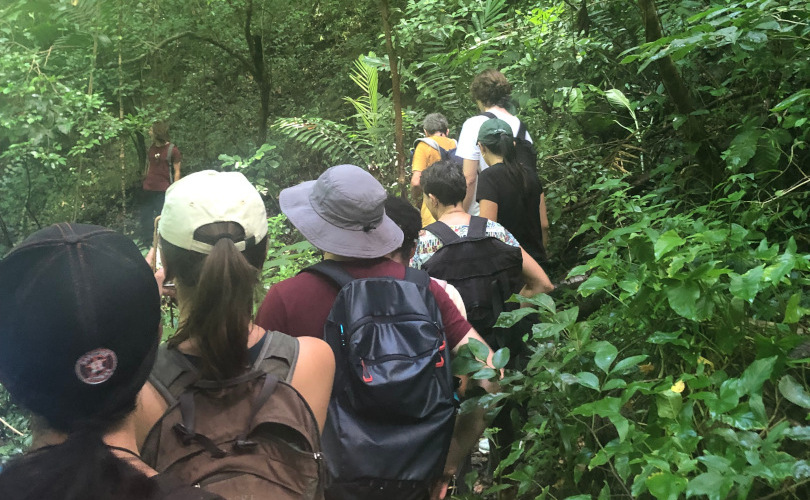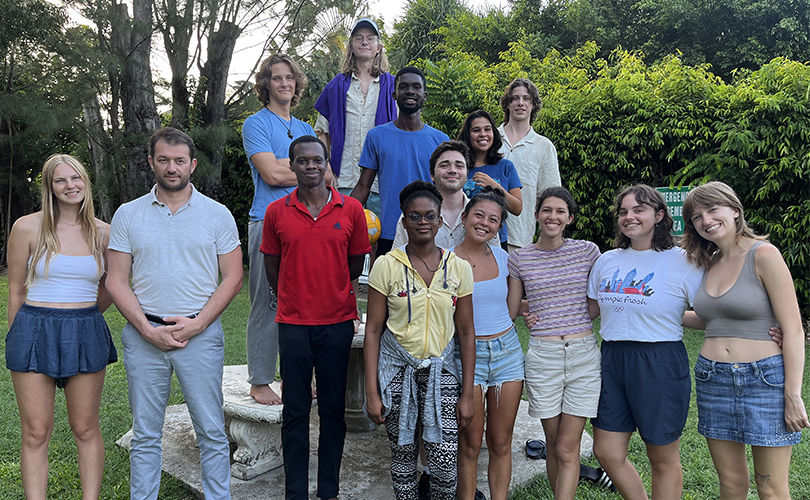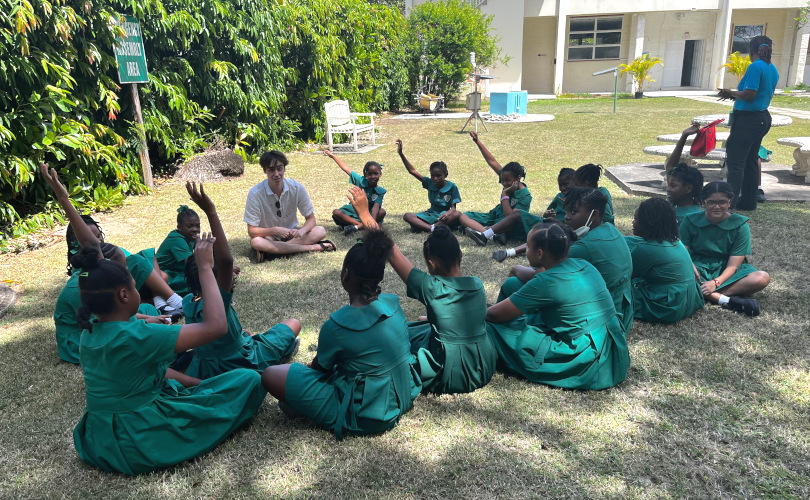When it comes to nurturing a passion for sustainability, Janis Field believes there’s nothing better than being out in nature – and no better place for this than Barbados.
“It is an immersive experience to be in Barbados,” says Field, a Canadian conservation advocate who has been living on the small Caribbean island part-time for over a decade. “Seeing all that beauty inspires us to get outside and be stewards of this planet.”
Field recently established a fund to support the Bellairs Research Institute, the McGill field station in Barbados that provides a teaching and research window into the impact of climate change in tropical regions.
Though she had no prior links to McGill, Field says that visiting the Bellairs campus and meeting the students there inspired her to get involved with the Institute, which is celebrating its 70th anniversary this year.
“We are a field station so the whole idea is to create a yearning for knowledge – a want to study – not only with the persons who are coming from McGill, but for those who are within our community in Barbados,” says Kim King, manager of the Bellairs Research Institute.

Janis Field (right) with McGill student Emma Bergeron Quick in Barbados.
Located right on the ocean next to the Folkestone Marine Reserve, Bellairs has ready access to a coral reef, estuaries, mangroves, and other marine habitats. It was originally a hub for marine biologists when it was established in 1954, but King explains that it now welcomes researchers and students from a wide variety of disciplines.
Many of the students who are living and studying at Bellairs are enrolled in the Faculty of Science’s Barbados Field Study Semester (BFSS), a three-month program for undergraduates that focuses on sustainability in the Caribbean.
The BFSS program is led by Professor Virginie Millien of the Department of Biology, who describes Bellairs as “a well-hidden gem”. She emphasizes that Barbados provides McGill students with a unique perspective on sustainability.

Barbados Field Study Semester students visit Turner’s Hall Wood, the last remaining patch of original tropical forest in Barbados.
“Barbados is like a microcosm where everything is exaggerated: biodiversity loss, extreme climate, and a political scene where there is great leadership on sustainability,” says Millien, referring to the Prime Minister of Barbados, Mia Mottley, who is known internationally for holding wealthy nations to account for their outsized role in climate change.
“McGill students have heard about biodiversity loss in Canada, but I think you really see it in Barbados because all the endemic species are gone. So this experience is taking them to another level of understanding.”
A ‘win-win’ for Barbadian and McGill students
When Millien was tasked with reviving and redesigning the BFSS program in 2021, one of her goals was to establish a close partnership with the University of the West Indies (UWI) at Cave Hill in Barbados.
Now UWI professors are involved in teaching and mentoring McGill students, and the BFSS program is open to undergraduate students at both McGill and UWI.
Field’s gift – which aims to increase access to the Institute for Barbadian students – is providing essential funding for this partnership by covering costs related to the inclusion of UWI students in the BFSS program.
“I think it's a win-win situation, if you look at all the exposure the McGill and UWI students are getting,” says King, who is Barbadian and highlights the importance of collaborating with the local community. “We are so grateful that Janis Field has seen the need and has opted to support this cause.”
Isabella Serrette was one of four UWI students who joined the BFSS program for the first time in 2023, thanks to funding from Field. As an environmental science student, Serrette had heard of Bellairs but didn’t know how to get involved. “So when that program became available, it was the perfect opportunity,” she says.
“You get to see the island in a different way,” says Serrette. “Obviously I’ve lived there my whole life but when you get to see other people experiencing it for the first time, you see things in a new light.”

The 2023 cohort of the Barbados Field Study Semester, including Isabella Serrette (front row, third from right).
Like the McGill students, Serrette had to complete a field-based research project. Her group chose to test methods to control the population of an invasive flatworm species, which involved much trial and error with traps and food lures.
At the end of the program, all of the UWI participants were invited to fly to Montreal to present their research at the Faculty of Science’s poster showcase in March 2024.
The whole experience had a major impact on Serrette and ultimately led her to apply for a MSc in Biology at McGill. She was admitted in Fall 2024 and is now doing research on soil fauna in the Caribbean under the supervision of Professor Brian Leung, who she met through the BFSS program.
“It definitely helped to already have a connection with the professors at McGill,” says Serrette, who was excited to find a supervisor who shared her interest in tropical ecology.
Serrette adds that having Canadian parents and being a dual citizen made the application process easier for her, but she hopes that Barbadians who don’t already have ties to Canada will be able to benefit from Bellairs like she did.
“It’s a really good opportunity for Barbadian students to meet Canadian profs and for Canadian profs and students to meet Barbadians,” says Serrette. “It allows you to realize that there are researchers in the Caribbean, not just the Global North, who are working really hard on these topics.”
‘I am going to focus on the hope’
Field believes that Bellairs can help boost collaboration between Barbados and Canada – and between researchers and policymakers – on issues like sustainable fishing, coral reef restoration and food and water systems. She sees endless potential for the Institute as it looks to the future on its 70th anniversary.
“I am going to focus on the hope,” says Field, who is passionate about promoting STEM (science, technology, engineering and math) from an early age, especially for girls. In addition to supporting UWI students, her gift includes funding to help school-aged children participate in the Institute’s programs.

Elementary school students participate in an educational activity at the Bellairs Research Institute.
Educational programming for kids is an area Bellairs is looking to develop, says King. As part of anniversary celebrations this December, the Institute will be welcoming 300 Barbadian children for a science workshop with live experiments hosted by award-winning science educator Frederic Bertley, BSc’94, PhD’00, DSc’24.
For Field, these are the kinds of opportunities that can change a young person’s life. “I think about getting that eight-year-old and creating a whole life cycle from the moment they step on the Bellairs campus to potentially doing graduate studies with McGill and becoming leaders who can impact policy and business.”
“We need more science literacy, more marine conservation literacy, and more extreme weather literacy – because we all share the same Atlantic Ocean.”

